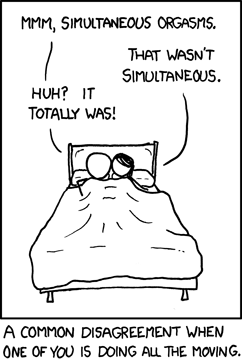514: Simultaneous
| Simultaneous |
 Title text: I'm leaving you for your twin. He's more mature than you by now. |
- This comic links to the Wikipedia article about Relativity of simultaneity.
Explanation
Cueball and Megan are talking about the sex they just had. Cueball is remarking on how they both achieved orgasm simultaneously, but Megan disagrees. This comic is a play on Einstein's theory of special relativity. One piece of the theory deals with two observers who are moving at close to the speed of light relative to each other. According to Einstein, events that appear simultaneous to one observer will appear to happen at separate times to the other. So when one partner is moving and the other isn't, it's possible that they experience their orgasm at different times relative to each other. That would require one partner to be moving really fast in one direction, which would make them a really bad partner.[citation needed] On small speeds, this effect could not be measured. The other joke is that partners often disagree with each other — even when the difference is minor and not important to the matter.
The title text is reference to the twin paradox, which arises from another piece of special relativity. In theory, if you stick one twin on a spaceship at near light speed and keep the other back on Earth, and assuming neither accelerates, each will perceive himself to age slowly while the other ages quickly, forming an apparent paradox. Megan expresses a preference for Cueball's older twin, who will be more "mature," meaning both older and presumably less combative about simultaneity. Again, the joke here is that at relativistic speeds, there could be disagreement about which twin is truly the "older" one.
Transcript
- [Cueball and Megan are in bed.]
- Cueball: Mmm, simultaneous orgasms.
- Megan: That wasn't simultaneous.
- Cueball: Huh? It totally was!
- [Caption below the panel:]
- A common disagreement when one of you is doing all the moving.
Discussion
When reading "one of whom is moving at close to the speed of light compared to the other" in the explanation I'm reminded of the (non-)joke "What's the difference between a duck? One of its legs is not the same." Because of frames of reference both of them are moving at close to the speed of light compared with the respective other. Which doesn't affect the disagreement about the simultaneity of observed events, of course. That still potentially/inevitably happens. 31.111.87.233 13:36, 28 May 2013 (UTC)
- Fixed. I also removed the acceleration bit, as it's not relevant here and made the sentence too wordy and confusing. --Someone Else 37 (talk) 03:10, 31 March 2014 (UTC)
You don't have to move close to the speed of light to create this effect, you just need to go close to the speed of light to make a noticeable difference.
Any amount of movement would cause this difference in perception, it would just be so small you would not notice it. In fact very accurate clocks have demonstrated this simply by flying one in a jet around the world while the other sat still.
Even if you walked around the world there would still be some effect. So there is no need to assume the there was any near speed of light sex, just a disparity in the amount of movement made by the two partners. 184.66.160.91 19:37, 7 July 2013 (UTC)
OH GOD WHAT IS THIS COMIC?!? 172.68.2.100 17:05, 28 March 2024 (UTC)
- I believe answering that question is precisely the point of this website. 172.71.134.39 13:48, 19 September 2024 (UTC)
 Add comment
Add comment
